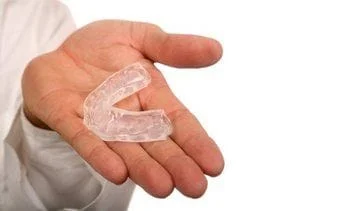Many people are afflicted with bruxism, or teeth grinding. Some people may do this consciously during the day, but it is a larger problem at night while you are asleep. Grinding your teeth can damage enamel, wear down teeth, cause jaw joint or jaw muscle pain, or irritate the gum and bone around your teeth. Clenching and grinding potentiates periodontal infection and can make it worse. The noise from teeth grinding can also disturb your spouse's sleep if loud enough. Clenching also will disturb your sleep.
If you grind your teeth you should consider a bite splint. The bite splint is not very similar to a mouth guard worn by athletes. It is a hard plastics that provides a barrier between your top and bottom teeth while you sleep. it is adjusted so that your jaw muscles cannot clench as hard as you can on your own teeth. All night guards are custom fitted for comfort and to allow for proper breathing and may help sleep. Your dentist will take an impression of your teeth and take measurements from your head and face. Additionally, we will record a central relaxed and harmonious jaw relation and create the bite splint right here in the office. Bite splints are very durable and can be used for many years; however, if you clench or grind very hard, your bite splint may have to be replaced much sooner.
There are also some things that you can do to try to stop teeth grinding. You can train your jaw to be free and easy rather than clenched. Refrain from chewing gum or on other objects like pens. You should also avoid alcoholic drinks and drinks with caffeine, especially at night near bedtime, as these can increase the likelihood you will grind your teeth. Some anti-anxiety medications and antidepressants actually promote tooth grinding. If you suspect you might be grinding your teeth at night set up an appointment with us today.
25 State Street | Montpelier, VT 05602 | Phone: 802-229-4840

